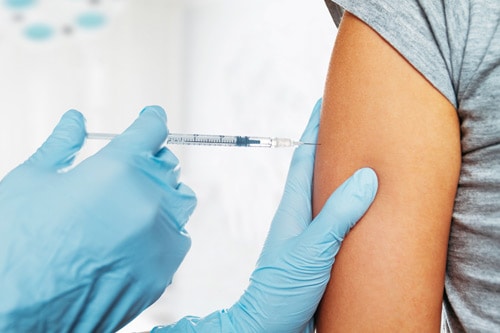
Vaccination rates among UK children aged under five are dropping “across the board” in England, leaving thousands without protection, according NHS Digital figures.
Rates of coverage for all 13 recommended childhood vaccinations, including the first dose of the MMR shot that protects against measles, mumps and rubella – given at 24 months – has now fallen for five years in a row.
First-shot MMR coverage is now 90.3%, well below the World Health Organization (WHO) recommended level of 95% to prevent outbreaks. Meanwhile the proportion of children who receive the second dose at five years has fallen to 86.4%, says the report, which is co-authored by Public Health England.
The UK recently lost its measles-free status as a direct result of the fall in rates of MMR vaccination, which has been in decline amid the continued dissemination of a now entirely discredited hypothesis – put forward by Andrew Wakefield in the late 1990s – that the vaccine was linked to autism.
Cases of hospitalisation for measles in England rose by two-thirds in 2018/19 compared to the previous year, to 328 from 198, with the UK now thought to have the second-lowest MMR vaccination rate in Europe after France.
Prime Minister Boris Johnson has already called for urgent action to raise MMR vaccination rates above the 95% level again, but alarmingly vaccine scepticism seems to be spreading to other routine shots, according to the latest figures.
The figures also showed decreases in coverage of the 5-in-1 vaccine – which protects against diphtheria, tetanus, pertussis (whooping cough), polio and Haemophilus influenza type b (which can cause meningitis) – for the sixth year in a row, with coverage at 92.1% in children aged 12 months.
Responding to the figures, British Medical Association (BMA) public health medicine committee chair, Dr Peter English, said: “it is…extremely concerning to see a decrease in vaccination uptake given this is largely avoidable”.
He went on: “There is a clear need to curb the damaging spread of false and misleading information on vaccinations by enforcing standards and placing legal obligations on social media corporations. More importantly still, the government must implement an effective vaccination strategy that addresses the wide-ranging factors behind this decline and deliver adequate resources to ensure targeted, comprehensive vaccination programmes that reach those most in need.”
Last month, Sheuli Porkess (pictured below), executive director of research medical and innovation at the Association of the British Pharmaceutical Industry (ABPI) said that “tackling hesitancy about using vaccines and addressing misinformation needs to be a priority so that the next generation of vaccines can have the same impact”.

Sheuli Porkess
She pointed to the clear impacts of campaigns such as the meningococcal B vaccination programme, which nearly halved cases of invasive meningococcal disease just 10 months after introduction in 2015, and a 77% decline in lab-confirmed rotavirus infections among infants since vaccination started in 2013.




